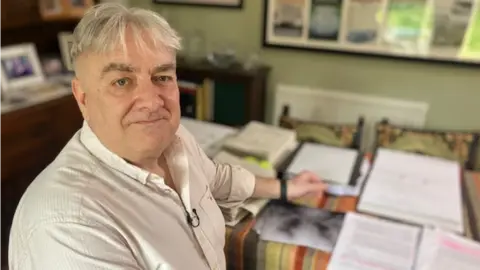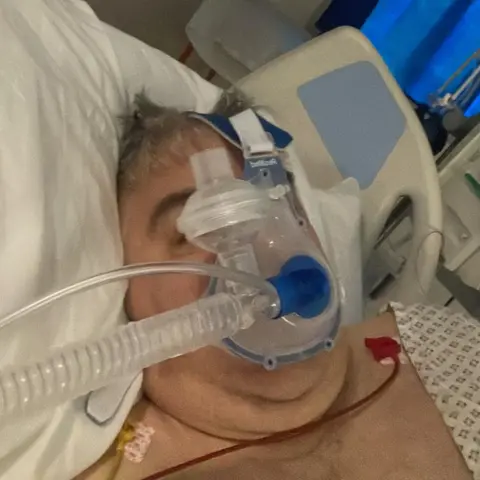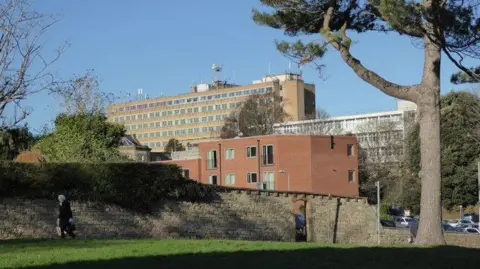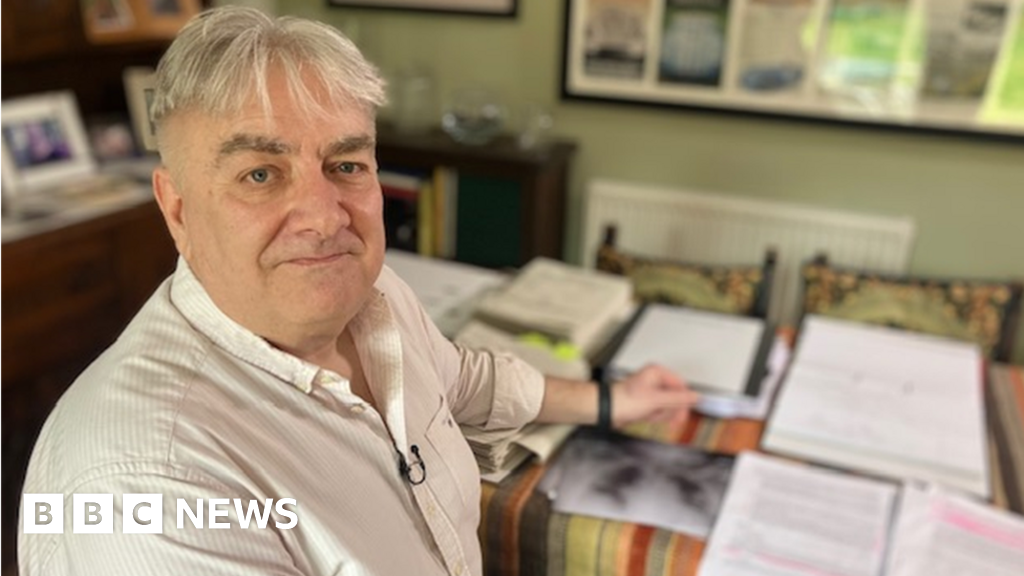Matthew Hill,BBC West, Health Correspondent
 BBC
BBCA hospital has paid £3,000 in compensation after failing to follow its own protocol to get consent to take a patient’s DNA.
Stuart Brown, 57, complained his genetic data was taken for a research project without informed consent and while he was in a coma.
He had been admitted to Yeovil District Hospital’s intensive care unit in November 2021 when he contracted Covid.
Somerset NHS Foundation Trust has admitted “deviation from protocol” in gaining consent to take DNA from seven patients, but maintains they were still properly informed.
While Mr Brown was in a coma, his wife Annette was called by the hospital on his behalf, as the trust had to obtain consent to take his DNA.
It was for the GenOMMIC research study – a UK-wide project which aims to find genetic factors that determine outcome in critical illness in more than 23,000 adults.

Mrs Brown said: “I fully appreciated it was a national study, but the benefit that swung the balance of him doing it was that he would potentially benefit.
“The suggestion was that he could potentially find out about any genetic factor that would predispose him more to being affected by Covid.”
Mr Brown, from Sturminster Newton in Dorset, then accessed his medical records and found out this was not the case.
He told the BBC: “My wife said she was asked to give consent over the phone and that giving consent would be a direct benefit to me and that when the paperwork arrived it was not the case.”
Mr Brown subsequently withdrew from the study months later after being discharged home. The DNA sample was destroyed.
However, to maintain the integrity of the study, his genomic sequence was kept in an anonymous form.
Mr Brown said: “One of the very highest people in the trust wrote me an email which said he appreciated that the form said that this information sheet should be read out [to the patient], but for practical purposes that didn’t happen.”
Audit calls
He added: “What upsets me is I have spent 18 months [working on this]. I have tried with regulatory authorities, I have tried with the hospital, GenOMMIC to say ‘look is it not reasonable to have an audit to find out how wide this problem is?’
“But I have been unsuccessful in doing that.”
Through a Freedom of Information request, Mr Brown found out 70 patients at Yeovil took part in the study, and 23,400 in UK.
The trust has confirmed with the BBC that seven patients in total had DNA taken when there was a “deviation in protocol”, including in Mr Brown’s case.
Mr Brown added: “Bearing in mind the person said they don’t keep to the consent procedure because of practical reason, it is not a big leap to say there’s lots of other people involved.”
 Chris Allen/Geograph
Chris Allen/GeographA letter from a hospital solicitor in response to his complaint said: “As to what harm you have suffered as a result of your DNA being taken and included in the study however, this appears to be limited to the physical act of taking the blood sample without consent.”
The solicitor dismissed Mr Brown’s claim he had suffered post-traumatic stress disorder, saying: “We have not seen any evidence that meets the diagnostic criteria and links the condition you allege you suffer from the taking of blood sample without consent as opposed to your illness with Covid and the circumstances surrounding this.
“While our [hospital] trust client is very sorry that there were deviations from the protocols for taking consent, our investigations find that liability is not established.”
Despite this, Mr Brown accepted £3,000 compensation from the hospital trust.
‘Lost in the post’
The NHS in Somerset has told the BBC there were two deviations from protocol in the way Mr Brown’s consent was obtained, but it concluded “none of these deviations mean that proper informed consent was not obtained before the sample was taken”.
It continued: “A copy of the record of telephone consent was to be posted. The site confirmed it was sent and perhaps lost in the post.”
David Orr, a transparency campaigner based in Somerset, said: “It’s fairly clear that because they haven’t said how they are going to use the information that [means] that technically there hasn’t been permission of the patients to go ahead with it.”
He added he thought it was “a significant failing and I think the Information Commissioner’s office would not be happy”.
The University of Edinburgh, which is in charge of the GenOMMIC research study, said: “We are respectful of participants’ right to withdraw their consent at any time and we can confirm that all procedures relating to the giving of consent, and its withdrawal, have been correctly followed for all participants in this study.”


